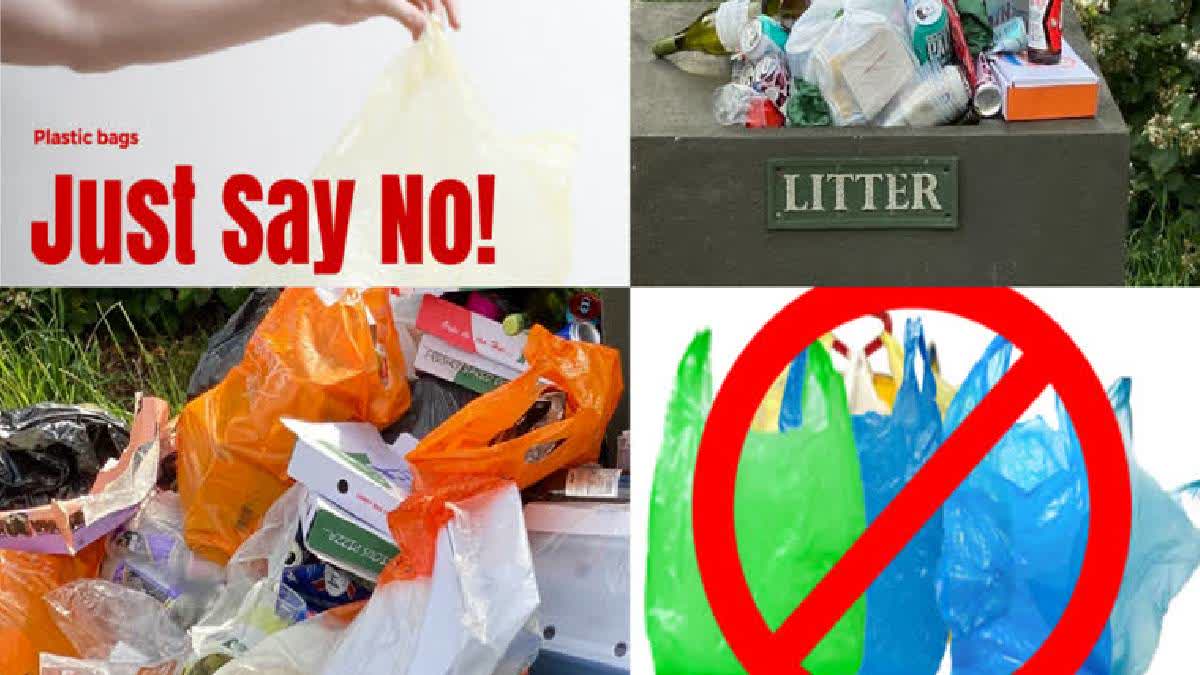Hyderabad: On July 3, the world observes International Plastic Bag Free Day. The goal of the day is to raise awareness of the significance of recycling and composting plastic trash as well as the zero-tolerance policy against plastic pollution.
Plastic bags are easy to use but harm the environment. They take a long time to break down, ending up in soil and water, hurting nature and sea creatures. They block drains, mess with recycling, and pollute rivers.
History:
On July 3rd, 2008, Zero Waste Europe launched a campaign aimed at addressing the problem of single-use plastic bags. Afterwards, in 2015, the European Union adopted guidelines with the aim of reducing the use of single-use plastic bags. As time went on, the movement gained a lot of momentum and many nations implemented plastic bag bans. Today, this day has developed into an international celebration that is observed by many nations.
The Harmful Effects of Plastic Bags:
Environmental effects:
Plastic bags are bad for the environment because they last a long time and cause pollution and litter. When not disposed of properly, they can harm land, water, and sea life. Animals often mistake them for food or get stuck in them, leading to serious injuries or death. This disrupts ecosystems and affects many species.
Health risks:
Plastic bags can harm both people and environment. They can release harmful chemicals when exposed to sunlight, affecting soil and water. As they break down, they turn into microplastics, which can be eaten by animals and humans, potentially causing health problems. By knowing these risks, we can make better choices to lessen the damage caused by plastic bags.
Steps to Cut Down on the Use of Plastic Bags:
- Creating a mindset shift towards plastic-free alternatives.
- Personal actions and lifestyle changes.
- Inspiring others to adopt sustainable practices.
- Spreading the word through social media and campaigns.
- Collaborating with businesses and retailers.
- Government and policy interventions.
Few Sustainable Plastic Bag Alternatives:
- Bio Plastic Bag: Bioplastic is a naturally occurring plastic material made from plants that can replace traditional plastic bags made from fuels.
- Mushroom-Based Bags: Novel and biodegradable bags that are an alternative to plastic are made from mycelium, a substance obtained from mushrooms.
- Paper Bags: Paper bags have emerged as one of the most creative biodegradable alternatives in the fight against single-use plastic bags.
- Canvas Bag: Cotton, canvas, and various synthetic and recyclable materials are used to make canvas bags.
- Reusable cloth Bags: There is nothing like reusable cotton bags for carrying purposes. You can either purchase one or make one from your old or out-of-date clothes.
- Jute Bags: Jute bags are natural and biodegradable, which reduces the health risks connected with plastic bags' dangerous components.
Plastic Bans Around the World:
In 2002, Bangladesh became the world's first nation to ban thin plastic bags when it was discovered that they were a major cause of drainage system blockage during extreme flooding. Soon after, nations including South Africa, Rwanda, China, Australia, and Italy did the same.
In India:
India has banned production, distribution, and use of certain single-use plastic products, such as trays, plates, cups, straws, and polystyrene containers from July 1 2022. The plastic carry bag is included in the list of single-use plastic items.
The 2024 Plastic Overshoot Day (POD) Report predicts that 51 percent of this volume will come from China, India, the US, and Japan. India is expected to discharge 391,879 tonnes of microplastics into the water, ranking second globally in waterbody pollution after China (787,069 tonnes), according to an analysis conducted by the non-profit organization EA Earth Action in Switzerland.
Telangana created the most plastic waste in India in fiscal year 2021, reaching about 473,000 metric tons. Tamil Nadu and West Bengal came in the second and third positions that year, with each producing more than 400,000 metric tons of plastic waste.
Some Facts About Plastic:
- Every year, 5 trillion plastic bags are used worldwide.
- A plastic bag takes a 1000 years to break down in a landfill. Sadly, the bags photodegrade rather than fully breakdown, turning into tiny plastic particles that retain poisons and harm the environment.
- Wildlife is directly harmed by plastic.
- Plastic bag chemical leachates inhibit the growth of Prochlorococcus, a marine bacterium that produces one tenth of the oxygen in the globe, one of the most significant microorganisms in the planet.
- Globally, just 1% to 3% of plastic bags are recycled, according to some statistics.
Read more
National Doctor's Day 2024: History, Significance & Challenges



